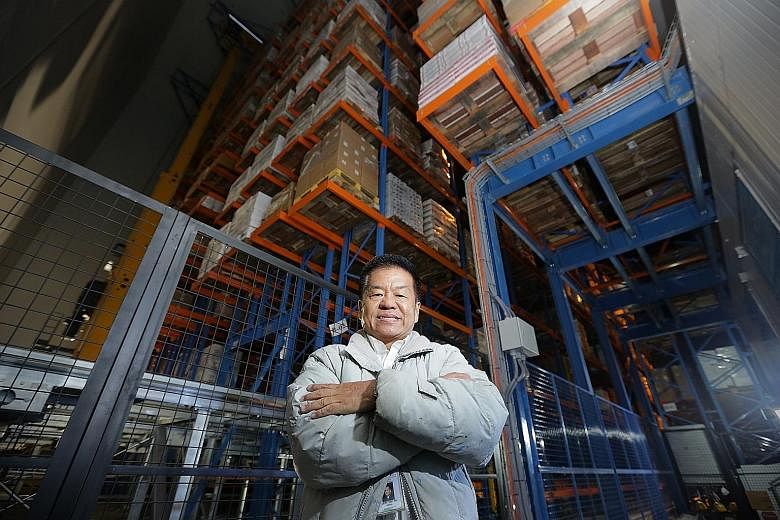Q What does Mandai Link Logistics do?
A We focus a lot on third-party logistics. We have a good knowledge of cold-chain handling and we know how to properly handle frozen meat and chilled meat - not only in the cold room, but also the chiller room and the air-conditioned room. Our headcount now is about 100. Our revenue is around $15 million a year.
Q How did you get started in the business?
A In the mid-1990s, there was a company called Pin Foods. It was operated by my brother-in-law. This business got into big trouble and we were called by the family to assist in saving the Tan family business. So we restructured the company, from Pin Foods to Pin Corporation. Pin Corporation's core business was the import and distribution of frozen meat.
Q So how did Mandai Link Logistics grow out of that?
A The business grew and we needed more imports, but we needed more storage. We had to rent, but had to pay high rental charges; it was inconvenient as it was not our own property. At the end of 2005, we went to JTC to ask for land. What we wanted was a big piece of land, rectangular, because we wanted to implement an ASRS (Automated Storage and Retrieval System).
When we signed with JTC, we formed a new company, doing logistics. Because this is warehousing, not a trading company, we formed a subsidiary. So we used the name Mandai Link, because the property is on the road named Mandai Link, and Link sounds like the word for "long" in Teochew, so we called it Wan Li Long (ten thousand-mile dragon), since Mandai is Wan Li (in Mandarin).
Q What makes Mandai Link Logistics stand out from the competition?
A At that time, Singapore had several sets of ASRS installed, but most were white elephants. There were two running at the time, but at low efficiency and very primitive. When we announced to the market that we were building an ASRS cold store, many of our competitors said that we wouldn't last one or two years - it was sure to be another big white elephant. Not a small elephant, a big elephant - 25,440 pallet positions.
Our manpower didn't have to increase so much, because it was automated. The efficiency is almost 100 per cent. We are using this facility to store goods and to replace forklifts. It also saves land because we can build up.
Q How about your ISO certification for security management?
What was the process of obtaining certification like?
A To have this, first, you must have a lot of security, closed-circuit television cameras, security controls. Do you know that when I come in on a Sunday, I have to write in the guard's book what I've come in for, and at what time? Because it's not my office hours. When I leave the facility, at the gate, I have to open my car boot for inspection. By the reception, there used to be a parking space. In the past, all directors could park their cars there. The experts said that under ISO 28000, the private carpark would not be allowed as its close proximity to the warehouse posed a security threat from bombs or terrorists. We were quite reluctant to comply, but we had no choice in order to maintain this ISO 28000.
Q That sounds very challenging.
Why did you decide to get the certification?
A We have got used to it. We have to show that we are a warehouse of high standards. If you put your goods here, it's safe.
If we focus on only the local market, we wouldn't need ISO 28000. We would not even need Tapa (Transported Asset Protection Association) accreditation. But we are eyeing the foreign customers.
I was in South Africa a few months ago and visited some fruit exporters. They are slowly starting to sell to China. We are encouraging them to use Singapore as a transshipment hub, to store their fruit here. We are able to convince them based on our high efficiency, our GST-bonded warehouse facilities, our connection to Malaysian customers. With all this ISO 28000, Tapa certification, we are better able to convince them.
Q And what's the road ahead for you?
A We have a branch office in Surabaya, Indonesia. We set up our office last year, in September, to explore the market there. Indonesia is our first phase.
There will be a Phase 2 - we are targeting Thailand and Malaysia. In fact, we are already working in Bangkok, serving Ikea Bangkok. We don't have a physical facility there, but we work with a very good partner - Japanese cold-room operators - remotely from Singapore. In Malaysia, the same thing. Of course, in Singapore, we serve Ikea Alexandra and Tampines, so all the Ikea goods are already here. We exclusively serve their food division.
In the future, we might set up a branch office in Bangkok to serve other customers, not just Ikea.

